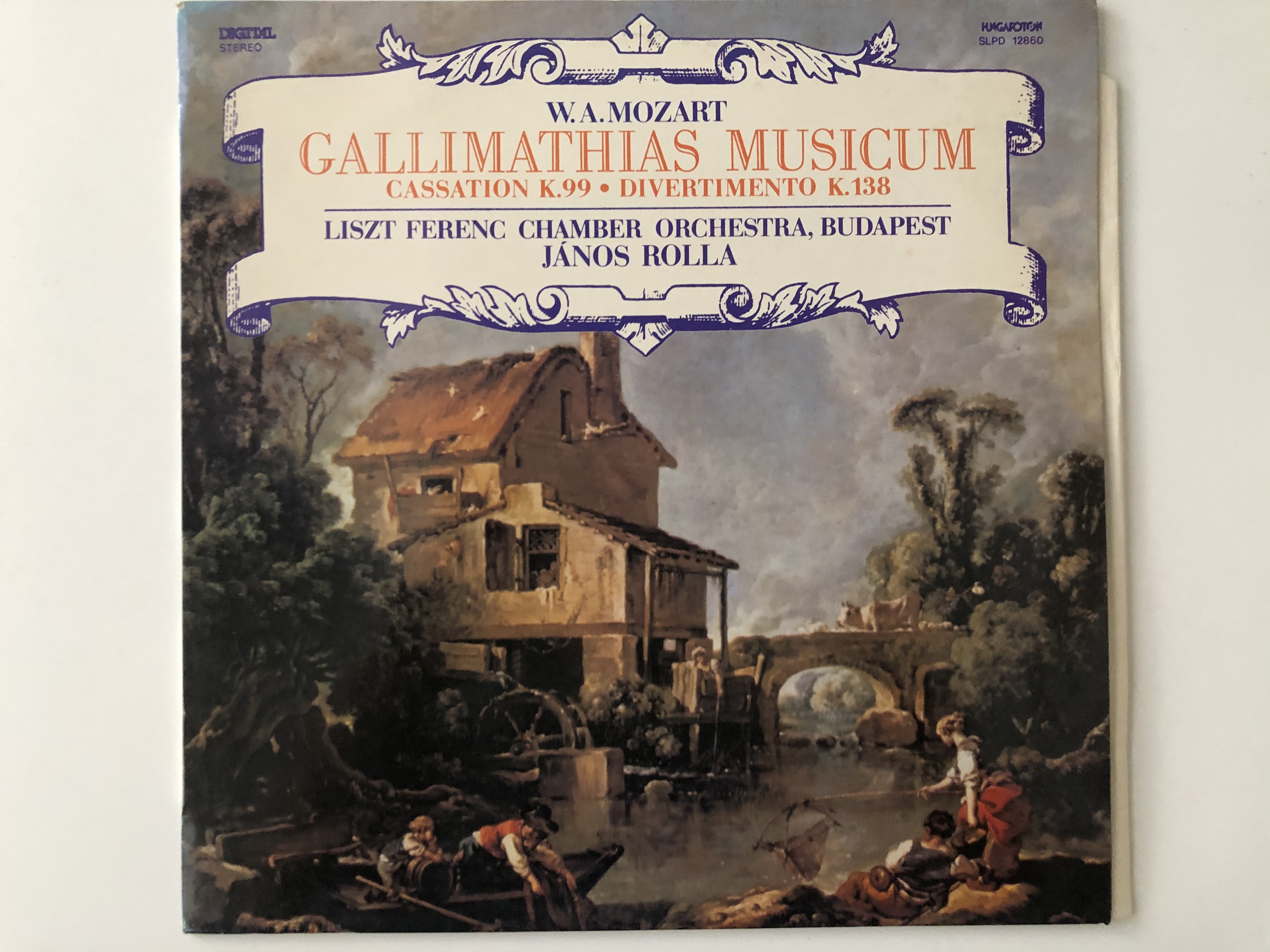Description
W. A. Mozart - Gallimathias Musicum, Cassation K. 99, Divertimento K. 138 / Liszt Ferenc Chamber Orchestra, Budapest, János Rolla / Hungaroton LP 1987 Stereo
SLPD 12860
Born in Salzburg, in the Holy Roman Empire, Mozart showed prodigious ability from his earliest childhood. Already competent on keyboard and violin, he composed from the age of five and performed before European royalty. At 17, Mozart was engaged as a musician at the Salzburg court but grew restless and travelled in search of a better position.
While visiting Vienna in 1781, he was dismissed from his Salzburg position. He chose to stay in Vienna, where he achieved fame but little financial security. During his final years in Vienna, he composed many of his best-known symphonies, concertos, and operas, and portions of the Requiem, which was largely unfinished at the time of his early death at the age of 35. The circumstances of his death have been much mythologized.
He composed more than 600 works, many of which are acknowledged as pinnacles of symphonic, concertante, chamber, operatic, and choral music. He is considered among the greatest classical composers of all time, and his influence on Western music is profound. Ludwig van Beethoven composed his early works in the shadow of Mozart, and Joseph Haydn wrote: "posterity will not see such a talent again in 100 years".Wolfgang Amadeus Mozart (teljes neve Johannes Chrysostomus Wolfgangus Theophilus Mozart) (Salzburg, 1756. január 27. – Bécs, 1791. december 5.) osztrák bécsi klasszikus zeneszerző, zongorista, karnagy és zenepedagógus. Zenei tehetsége korán megmutatkozott, első zeneműveit hatévesen komponálta. Édesapja, Leopold Mozart pedig, aki a salzburgi érseki udvar muzsikusa volt, lejegyezte őket, és mindent megtett annak érdekében, hogy fia minél alaposabb zenei képzésben részesüljön. Mikor nyilvánvaló lett számára Wolfgang rendkívüli tehetsége, úgy érezte, hogy kötelessége azt megmutatni az embereknek. Ennek érdekében hosszú koncertkörutakat szervezett gyermekei számára, amelyek során a csodagyerekek a korabeli Európa szinte valamennyi jelentős zenei és uralkodói központjába eljutottak. A fiatal Mozartnak így lehetősége nyílt megismernie a korabeli Itália, Párizs, London, Bécs zenei világát. Tizenegy évesen már egész estét betöltő vígoperát komponált, tizennégy évesen pedig megírta első opera seriáját.
Tracklist:
| B-Dúr Cassatio K. 99 (63a) | |||
| A1 | I. Marcia |
2:38 | |
| A2 | II. Allegro Molto |
3:14 | |
| A3 | III. Andante |
4:04 | |
| A4 | IV. Menuetto |
2:35 | |
| A5 | V. Andante |
3:52 | |
| A6 | VI. Menuetto | 2:15 | |
| A7 | VII. Allegro — Marcia Da Capo | 6:08 | |
| B1 | Gallimathias Musicum (Quodlibet) K. 32 (Anh. 100a) |
17:36 | |
|
F-Dúr Divertimento K. 138 (125c) |
|||
| B2 | I. [Allegro] |
3:50 | |
| B3 | II. Andante |
5:15 | |
| B4 | III. Presto |
2:03 |
- Bassoon – László Hara (tracks: B1)
- Composed By – Wolfgang Amadeus Mozart
- Design – Péter Nagy (3)
- Directed By – János Rolla
- Engineer [Balance Engineer] – Ferenc Pécsi
- Harpsichord – Zsuzsa Pertis (tracks: B1)
- Horn – István Borza (tracks: A1 to A7, B1), Ádám Friedrich (tracks: A1 to A7, B1)
- Oboe – Gábor Dienes (2) (tracks: A1 to A7, B1), Péter Pongrácz (tracks: A1 to A7, B1)
- Orchestra – Liszt Ferenc Chamber Orchestra, Budapest
- Painting [Front Cover] – Boucher
- Photography By – Albert Kresz
- Producer [Recording Producer] – Tibor Erkel
- Sleeve Notes – Farkas Zoltán (3)
















